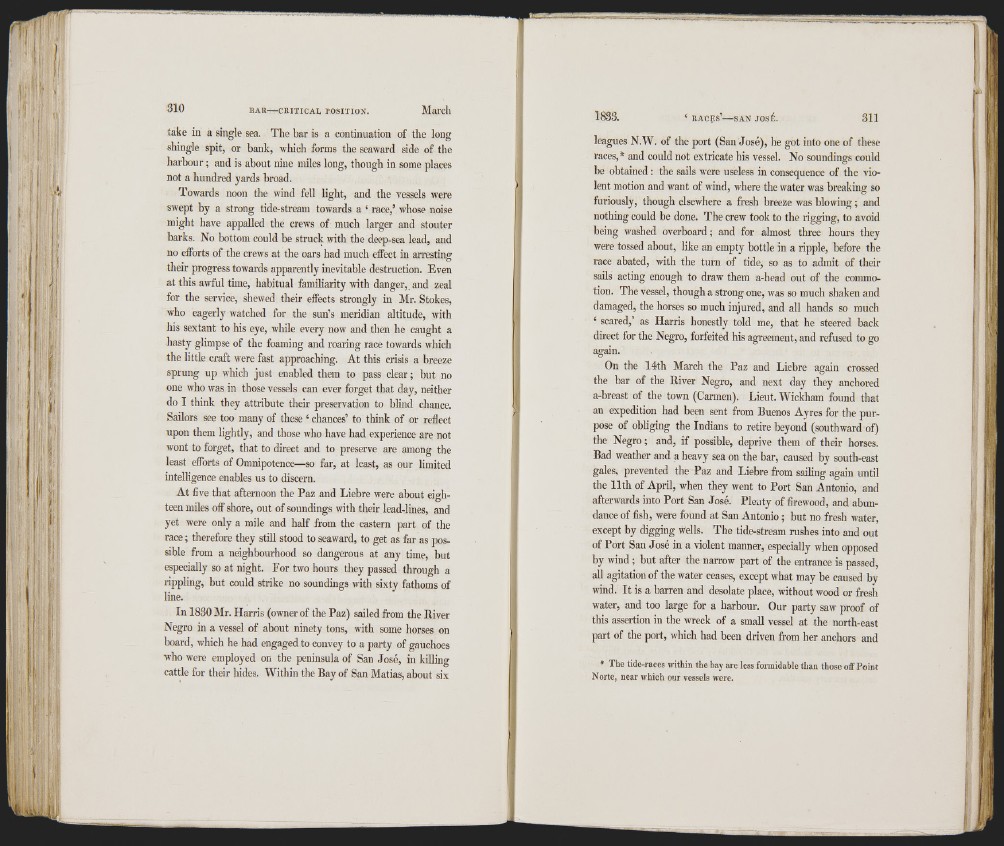
fix
take in a single sea. The har is a continuation of the long
shingle spit, or hank, which forms the seaward side of the
harhour ; and is ahout nine miles long, though in some places
not a hundred yards hroad.
Towards noon the wind fell light, and the vessels were
swept hy a strong tide-stream towards a ‘ race,’ whose noise
might have appalled the crews of much larger and stouter
harks. No bottom could be struck with the deep-sea lead, and
no efforts of the crews at the oars had much effect in arresting
their progress towards apparently inevitable destruction. Even
at this awful time, habitual familiarity with danger,, and zeal
for the service, shewed their effects strongly in Mr. Stokes,
who eagerly watched for the sun’s meridian altitude, with
his sextant to his eye, while every now and then he caught a
hasty glimpse of the foaming and roaring race towards which
the little craft were fast approaching. At this crisis a breeze
sprung up which just enabled them to pass clear; but no
one who was in those vessels can ever forget that day, neither
do I think they attribute their preservation to blind chance.
Sailors see too many of these ‘ chances’ to think of or reflect
upon them lightly, and those who have had experience are not
wont to forget, that to direct and to preserve are among the
least efforts of Omnipotence—so far, at least, as our limited
intelligence enables us to discern.
At five that afternoon the Paz and Liebre were about eighteen
miles off shore, out of soundings with their lead-lines, and
yet were only a mile and half from the eastern part of the
race ; therefore they still stood to seaward, to get as far as possible
from a neighbourhood so dangerous at any time, but
especially so at night. For two hours they passed through a
rippling, but could strike no soundings with sixty fathoms of
line.
In 1830 Mr. Harris (owner of the Paz) sailed from the Iliver
Negro in a vessel of about ninety tons, with some horses on
board, which he had engaged to convey to a party of gauchoes
■who were employed on the peninsula of San José, in killing
cattle for their hides. Within the Bay of San Matias, about six
1833.
leagues N.W. of the port (San José), he got into one of these
races,* and could not extricate his vessel. No soundings could
be obtained : the sails were useless in consequence of the violent
motion and want of wind, where the water was breaking so
furiously, though elsewhere a fresh hreeze was blowing ; and
nothing could be done. The crew took to the rigging, to avoid
heing washed overboard; and for almost three hours they
were tossed about, like an empty bottle in a ripple, before the
race abated, with the turn of tide, so as to admit of their
sails acting enough to draw them a-head out of the commotion.
The vessel, though a strong one, was so much shaken and
damaged, the horses so much injured, and all hands so much
‘ scared,’ as Harris honestly told me, that he steered back
direct for the Negro, forfeited his agreement, and refused to go
again.
On the 14th March the Paz and Liebre again crossed
the bar of the River Negro, and next day they anchored
a-breast of the town (Carmen). Lieut. Wickham found that
an expedition had been sent from Buenos Ayres for the purpose
of obliging the Indians to retire beyond (southward of)
the Negro ; and, if possible, deprive them of their horses.
Bad weather and a heavy sea on the bar, caused by south-east
gales, prevented the Paz and Liebre from sailing" again until
the I lth of April, when they went to Port San Antonio, and
afterwards into Port San José. Plenty of firewood, and abundance
of fish, were found at San Antonio ; but no fresh water,
except by digging wells. The tide-stream rushes into and out
of Port San José in a violent manner, especially when opposed
by wind ; but after the narrow part of the entrance is passed,
all agitation of the water ceases, except what may be caused by
wind. I t is a barren and desolate place, without wood or fresh
water, and too large for a harbour. Our party saw proof of
this assertion in the wreck of a small vessel at the north-east
part of the port, which had been driven from her anchors and
* The tide-races within the bay ai-e less formidable than those off Point
Norte, near which our vessels were.